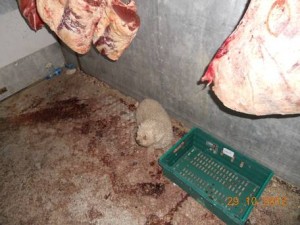Dead rats, bags of cows’ skins and mold-covered mayonnaise were just some of the reasons for the temporary closure of restaurants and other food outlets this year, according to records released by the Food Safety Authority of Ireland.
 Alison Healy of The Irish Times, writes the records, released under the Freedom of Information Act, also show environmental health officers ordered the temporary closure of premises because of filthy kitchens, rat and mouse droppings, and bizarrely, a wellington filled with cigarette ash.
Alison Healy of The Irish Times, writes the records, released under the Freedom of Information Act, also show environmental health officers ordered the temporary closure of premises because of filthy kitchens, rat and mouse droppings, and bizarrely, a wellington filled with cigarette ash.
The wellington was found on the premises of Giles Brothers Fish Shop in Phibsborough, Dublin, where an environmental health officer also found a radiator “covered in filthy cigarette ash”. He said the premises had a “history of non-compliance with food legislation”.
The order was lifted a few days later when the problems were remedied.
While final figures are not yet available for this year, it will be the second worst year on record for the number of closure and other enforcement orders issued.
Some 113 orders were served up until December 23rd, compared with 143 enforcement orders in 2013, which was the highest number to date. In 2012, 109 orders were issued.
Dr Bernard Hegarty, the authority’s director of service contracts, said environmental health officers were still finding “shocking conditions” in some premises.
“We’re seeing places where inspectors are finding evidence of pest infestations, of cockroaches, rodents and so on. Really there’s no excuse for that,” he said. “And that’s really not where a business should be if it wants to protect the safety and health of its customers.”
He said there were about 48,000 food businesses in the State “so we are still looking at quite small numbers of breaches” but there was no excuse for these breaches.
Ethnic food businesses accounted for more than half of the orders issued this year. Dr Hegarty said the FSAI was providing training initiatives focusing on sectors such as ethnic restaurants.
 Both babies were just 11 days old when they were rushed to hospital with the disease, which is linked to pet turtles.
Both babies were just 11 days old when they were rushed to hospital with the disease, which is linked to pet turtles.








